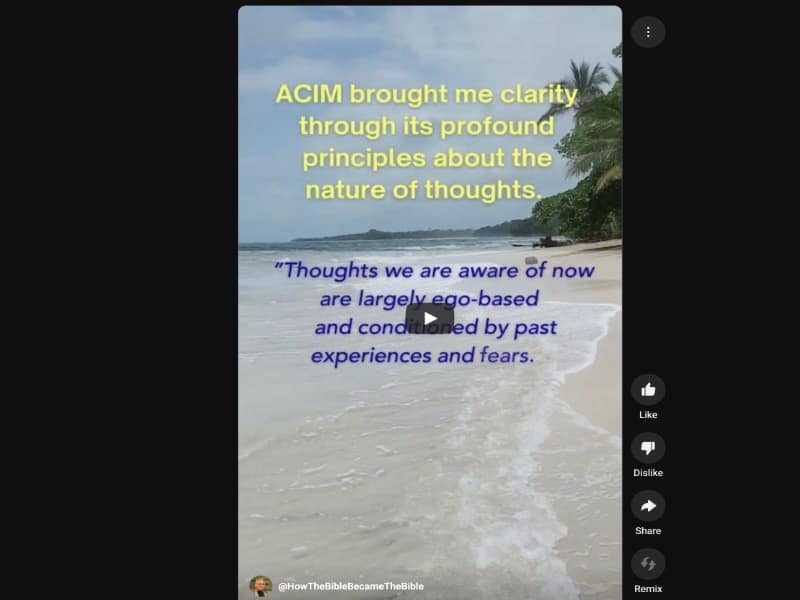Me, Myself, and the Holy Spirit
~ Donald L. O’Dell
Exploring the Human Side of Biblical History: Faith, AA Wisdom, and the Dangers of Literalism
The Bible, for many, is more than just a collection of ancient texts; it is a living document, full of stories, personalities, and lessons that have shaped the spiritual journey of millions. Yet, understanding the Bible in all its depth requires more than a surface reading-it calls for an exploration that merges historical context, practical wisdom, and personal experience. This is precisely the journey undertaken in "How the Bible Became the Bible," a work that weaves together the humanity of biblical figures, the transformative principles of Alcoholics Anonymous (AA), the spiritual insights of A Course in Miracles (ACIM), and the author’s own evolving faith.
Our Human Element Is More Than A Literal Device
The Bible, for many, is more than just a collection of ancient texts; it is a living document, full of stories, personalities, and lessons that have shaped the spiritual journey of millions. Yet, understanding the Bible in all its depth requires more than a surface reading-it calls for an exploration that merges historical context, practical wisdom, and personal experience. This is precisely the journey undertaken in "How the Bible Became the Bible," a work that weaves together the humanity of biblical figures, the transformative principles of Alcoholics Anonymous (AA), the spiritual insights of A Course in Miracles (ACIM), and the author’s own evolving faith.
The Human Personalities of the Bible One of the most remarkable aspects of biblical history is the vivid humanity of its characters. The Bible does not present its heroes as flawless; rather, it gives us a candid look at their struggles, doubts, and growth. From Moses’ reluctance and anger to David’s moral failings and repentance, the stories are deeply relatable. They remind us that spiritual growth is not about perfection but about an ongoing journey-a theme echoed in the author’s memoir-like reflections.
This human element is not just a literary device; it is a spiritual invitation. By seeing ourselves in the stories of those who came before, we are encouraged to engage with our own faith honestly, acknowledging both our strengths and our shortcomings.
The Practical Wisdom of Alcoholics Anonymous
Alcoholics Anonymous, with its roots in Christian spirituality, offers a set of principles that have helped countless individuals find freedom from addiction. At its core, AA emphasizes surrender, honesty, humility, and the importance of community-all values that resonate with biblical teachings. The founders of AA drew heavily from the Bible, incorporating its wisdom into the Twelve Steps and daily practices.
What sets AA apart, however, is its insistence on practical application. It is not enough to believe; one must act. The program invites participants to take inventory of their lives, make amends, and seek a higher power’s guidance in everyday decisions. These steps mirror the biblical call to confession, repentance, and transformation. For many, integrating AA’s wisdom with biblical faith leads to a more grounded and actionable spirituality.
Spiritual Enlightenment from A Course in Miracles
A Course in Miracles (ACIM) brings another dimension to the spiritual journey: the pursuit of inner peace and a shift in perception. ACIM teaches that true transformation comes from changing the way we see ourselves and the world-a message that aligns with the Bible’s call to “be transformed by the renewing of your mind” (Romans 12:2). By blending the psychological insights of ACIM with the narrative and ethical framework of the Bible, the author offers readers a holistic path to spiritual growth.
The Dangers of Interpreting the Bible Literally
Perhaps the most urgent message in this exploration is the caution against rigid Bible literalism. While the authority of Scripture is foundational for many believers, reading the Bible without regard for its genres, historical context, and intended audience can lead to misunderstanding-and sometimes, harm. History is replete with examples: from flat-earth theories and snake-handling practices to the justification of slavery and rigid gender roles, literalism has often been used to support dangerous or absurd conclusions.
A thoughtful reading of the Bible requires discernment. It means asking not just, “What does this say?” but “What did this mean to its original audience?” and “How does this apply to us today?” As theologian Matt Ayars notes, “A faithful reading of the Bible is not necessarily a rigidly literal one-it is a thoughtful, contextual, and theologically rich reading”. Only by honoring both the divine inspiration and the human context of Scripture can we avoid the pitfalls of over-literalism and discover the transformative power at its heart.
A Memoir of Spiritual Growth
Ultimately, "How the Bible Became the Bible" is more than an academic overview; it is a personal memoir of spiritual growth. The author’s journey-from street ministry to deepening faith, from grappling with addiction to embracing spiritual enlightenment-serves as a testament to the ongoing process of transformation. It is a story that invites readers to reflect on their own paths, to seek wisdom wherever it may be found, and to approach the Bible not as a static rulebook but as a dynamic source of inspiration and challenge. In a world where religious literalism is often wielded as a weapon, this book offers a timely and necessary reminder: the true power of the Bible lies not in rigid interpretation, but in its ability to speak to the complexities of the human heart. By merging history, practical wisdom, and spiritual insight, it opens the door to a richer, more authentic faith-one that is as relevant today as it was thousands of years ago
Comparing Methods
Traditionalists might pull out a hefty Strong’s Concordance or a leather-bound Bible with cross-references; spiritual Christians are more likely to swipe through a Bible app like YouVersion, selecting verses with an “appropriate” vibe.
Traditional study often happens in scheduled, hierarchical groups—think a priest or elder leading. Spiritual Christians? It’s egalitarian, organic—anyone can chime in, and the vibe is more collaborative than authoritative.
Traditional Christians often consider Bible study as a duty and discipline—a way to know God through His revealed word, as filtered by centuries of theology by the church. It’s heavy on intellectuals to the point where it becomes fear-mongering. There is a right way and a wrong way for believers.
Spiritual Christians are more likely to treat their Bible study like a lifeline to divine connection. They’re less about mapping theology and instilling correct behaviors, and more tuned into feeling God’s presence or hearing his voice which includes an inner understanding or resonance attuned to confidence, courage, and embracing the journey forward.

Summary
While traditional Christians consider Bible study as a requirement or duty to keep in line with church doctrines, spiritual Christians see this study as a boost, an open door, to discover personal experiences, maybe intuitive, that align themselves with feeling the light of God.
It's easy to compare these two types of worship when we ask the question, How will God connect with me?
Traditionalist folks are soaked in the communal and historical: what did the church say for centuries?
Spiritual folks want to unlock experiences, both in the immediate and as individuals, by asking, "What’s God saying to me now?"





